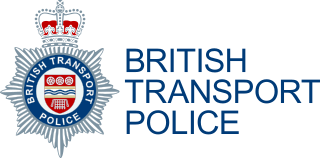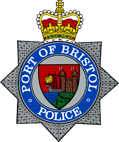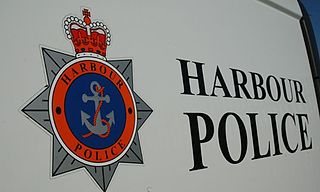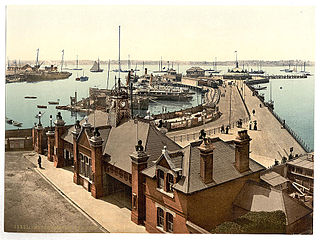Related Research Articles

A dinghy is a type of small boat, often carried or towed by a larger vessel for use as a lifeboat or tender. Utility dinghies are usually rowboats or have an outboard motor. Some are rigged for sailing but they differ from sailing dinghies, which are designed first and foremost for sailing. A dinghy's main use is for transfers from larger boats, especially when the larger boat cannot dock at a suitably-sized port or marina.

The British Transport Police (BTP) is a national special police force that polices railways and light-rail systems in England, Wales and Scotland, for which it has entered into an agreement to provide such services. The force is funded primarily by the rail industry, and does not receive central government funding. British Transport Police officers do not have jurisdiction in Northern Ireland unless working under mutual aid arrangements for the Police Service of Northern Ireland, in which case any duties performed on a railway will be merely incidental to working as a constable in Northern Ireland.

Transit police are a specialized police agency or unit employed by a common carrier, which could be a transit district, railroad, bus line, other transport carrier, or the state. Their mandate is to prevent and investigate crimes committed against the carrier or by or against passengers or other customers of the carrier, or those committed on the carrier's property.

The Port of Dover Police (PoDP) is a non-Home Office ports police force which provides a 24-hour policing service to the Port of Dover, Kent, England.

The Port of Bristol Police (PoBP) is a non-Home Office ports police force with responsibility to protect the port complexes and community situated at the mouth of the River Avon on the border between Bristol and Somerset. Officers are attested under powers in legislation derived from the Harbours, Docks and Piers Clauses Act 1847.
Falmouth Docks Police is non-Home Office ports police force whose primary role is security of Falmouth Docks. As of 2007 the constabulary numbered just four constables.
The Port of Tilbury Police is a non-Home Office ports police force responsible for the Port of Tilbury, owned by the Port of Tilbury London Ltd, a subsidiary of Forth Ports plc.

Tees and Hartlepool Harbour Police is a non-Home Office ports police force responsible for Teesport, which is the UK's third largest port and is owned by PD Ports, situated along the south bank of the River Tees in north east England. The harbour police force is over 100 years old and was originally formed under the Harbour, Docks and Piers Clauses Act 1847.

The Dublin Harbour Police is a small, specialised police force in Dublin Port, Ireland operating under the jurisdiction of the Dublin Port Company.

The Port of Southampton is a passenger and cargo port in the central part of the south coast of England. The modern era in the history of the Port of Southampton began when the first dock was inaugurated in 1843. The port has been owned and operated by Associated British Ports since 1982, and is the busiest cruise terminal and second largest container port in the UK.

The Harbours, Docks and Piers Clauses Act 1847 is an Act of Parliament of the United Kingdom which governs harbours, docks and piers.

The Port of Portland Police is a non-Home Office ports police force responsible for the Port of Portland in Dorset, United Kingdom.

The Port of Southampton is a major passenger and cargo port located in the central part of the south coast of England. It has been an important port since the Roman occupation of Britain nearly two thousand years ago, and has a multifaceted history. From the Middle Ages to the end of the 20th century, it was a centre for naval shipbuilding and a departure point for soldiers going to war. The port also played a role in the development of hovercraft, flying boat services, seaplanes and the Spitfire fighter plane. Before the advent of jet travel, Southampton was Britain's gateway to the world. The port also played a minor role in the history of Britain's canals.
The Port of Tyne comprises the commercial docks on and around the River Tyne in Tyne and Wear in the northeast of England.
Competent harbour authorities (CHA) in the United Kingdom are those harbour authorities that have been given statutory powers relating to the provision of pilotage in their waters. The description was created by the Pilotage Act 1987, at which point a CHA had to be one whose harbour was wholly or partly within a pilotage district where at least one act of pilotage had been performed, or where a pilotage exemption certificate had been in force, between 1984 and 1987. However, the act provided a procedure by which other harbour authorities could be assigned CHA status and some harbours have taken advantage of this process. The Marine Navigation Act 2013 amended the Pilotage Act to provide a reverse process, so that harbour authorities could be relieved of CHA status.
Paul Geoffrey Crowther is a former police officer of the United Kingdom. He served as Chief Constable of the British Transport Police (BTP) from March 2014 until his retirement in February 2021.

Royal Pier is a derelict pier in Southampton, United Kingdom.

Town Quay is a quay in Southampton, England. A quay is first recorded on the site in 1411, known as Watergate Quay. This quay fell out of use in the 18th century and in 1803 was demolished and replaced with a new structure, used for goods and passenger services. Overcrowding made it unsuitable for passenger services, resulting in most of them relocating when the Royal Pier opened in 1833. Between 1829 and 1860, the memorial column raised to William Chamberlayne (MP) was located at the quay.
References
- 1 2 Head, Viv (17 May 2011). "Southampton Harbour Board Police 1847 - 1980". Website of the British Transport Police History Group. British Transport Police History Group. Retrieved 5 January 2013.
- ↑ "Southampton Harbour Reorganisation Scheme" (PDF). London Gazette . 17 February 1967. Retrieved 5 January 2013.